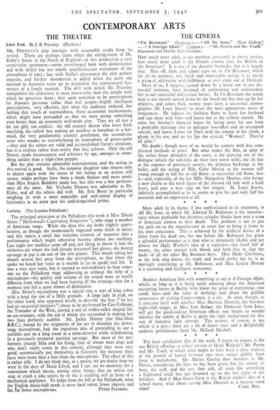THE CINEMA
How much more adult, as we overhear constantly at sherry parties, how much more adult is the French cinema than the British or the American! It is one of the drearier bromides, but it is largely true. Hats off, then, and school caps on, to Un Revenant, which for all its neatness, wit, finish and impeccable acting, is as pretty a piece of adolescent wish-fulfilment as ever came out of Denham.
Most of us, I suppose, turned down by a loved one in our dis- tressful twenties, have dreamed of confronting and confounding her in our successful and cynical forties. In Un Revenant the young man is not merely turned down by the loved one but shot up by her relatives, and comes back, twenty years later, a successful choreo- grapher (M. Louis Jouvet) to exact the most appropriate series of vengeances. He induces his faithless flame to leave her husband and run away with him—and leaves her at the railway station. He ruins her brother's financial hopes by luring away his son from a profitable marriage into an unhappy love-affair and an attempted suicide, and leaves Lyons for Paris with his tongue in his cheek, a gleam in his eye, and on his lips the cynical, "Women! They're all alike."
No doubt ; though most of us would be content with less com- plicated methods of proof. But what makes the film, in spite of the rather bitter absurdity of the story, is the glancing wit of the dialogue (which the sub-titles do their very worst with), the sly fun at the expense of provincial society, the glimpses backstage at the ballet, and the acting of Mlle. Gaby Morlay as the woman still young enough to fall for an old flame—a successful old flame, that is—and, especially, of the late Mlle. Marguerite Morino, who brings a new charm to the stock figure of the shrewd old lady with a kind heart, and puts a new edge on her tongue. M. Louis Jouvet, infinitely accomplished as he is, seems to give his part only half his attention and no expression at all.
* More adult in its theme, if less sophisticated in its treatment, is All My Sons, in which Mr. Edward G. Robinson is the manufac- turer whose profitable but defective cylinder blocks have sent a score of American airmen to their death. The problem is not to pin the guilt on to the manufacturer in court but to bring it home to his own conscience. This is achieved by the artificial device of a letter from his dead son, but not before Mr. Robinson has given a splendid performance as a man who is immensely likable and yet almost the Daily Worker's idea of a capitalist—one hand full of money, the other stained with blood, and both free to slap the backs of all the other Big Business boys. Miss Mady Christians, as the wife whp knows the truth and would profer not to, is as movingly convincing as Mr. Robinson, and Miss Louisa Horton is a charming and intelligent newcomer.
Another American film with something to say is A Foreign Affair, which, as long as it is being tartly amusing about the American occupying forces in Berlin (who know the price of everything—two candy bars—and the value of nothing) and about the gullible earnestness of visiting Congressmen, is a joy. As soon, though, as it concerns itself with whether Miss Marlene Dietrich, the German night-club singer, or Miss Jean Arthur, the Democrat from Iowa, will get the good-looking American officer, one begins to wonder whether the rubble of Berlin is quite the right background for this sort of romantic light comedy. The answer, of course, is no, which is a pity ; there are a lot of funny lines and a delightfully sardonic performance from Mr. Millard Mitchell.
* The least satisfactory film of the week, I regret to report, is the one British offering—a stilted version of Hugh Walpole's Mr. Perrin and Mr. Trail, in which what ought to have been a close analysis of the growth of hatred between two men swings giddily from farce to melodrama. Mr. Marius Goring does wonders as Mr. Perrin, considering the lines he has been given, but the school, its boys, the staff, and the way they talk, all seem like something a frightened small boy has dreamed up on the last night of the holidays. And if Miss Greta Gynt is the British studio's idea of a school nurse, what about casting Miss Dietrich as a matron some


































 Previous page
Previous page